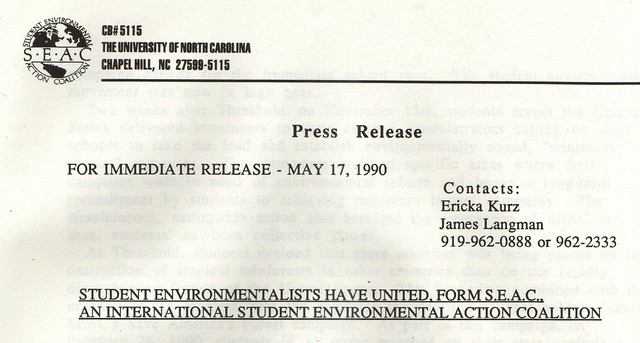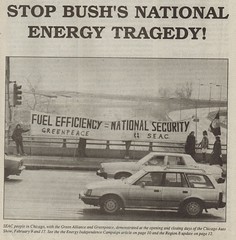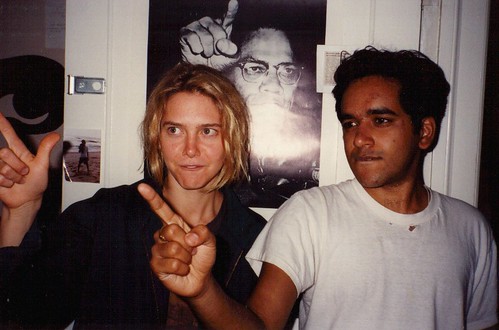

"UNC-CH students protest Exxon recruiting & policies," (Raleigh) News & Observer, 10/20/90. From right: Lisa Abbott, Ericka Kurz, Jimmy Langman, Alec Guettal, David Biggs, Erik Ose. Dan Coleman and Greg Gangi are near the far left.
Following the 1989 Threshold conference that drew 1,700 student eco-activists to Chapel Hill, SEAC became the largest and most significant U.S. student-led activist organization to emerge since the 1960s heyday of SDS. Ericka played a key role in guiding SEAC to become a democratically governed national student coalition. As SEAC's first National Campaign Coordinator, she set the tone for the group's willingness to challenge entrenched corporate powers by taking on the oil, energy, and chemical industries during inaugural campaigns for Energy Independence and Corporate Accountability.
Ericka was tragically murdered in 1993, but her spirit lives on in an entire generation of progressives who were introduced to activism through their involvement with SEAC. This archive documents some of Ericka's rich legacy of organizing work, as published in Threshold, SEAC's national magazine, and elsewhere during the years 1990-91. It also offers a glimpse of her hilarious wit and outsized, radiant personality that charmed and inspired all who knew and worked with her.
(Daily Tar Heel, 10/17/89)
A national student environmental conference to be held at UNC Oct. 27 to 29 has received much national and international publicity over the past few weeks...Threshold marks a major accomplishment for SEAC, allowing the group to bring environmental awareness not only to the campus, but also to the nation, members of the organization said.
(Daily Tar Heel, 10/20/89)
"A lot of us signed up for the class because we knew he was teaching it," said Ericka Kurz, a junior from Middleton. Wis. "Our class is planning to do something about this jointly. If he goes, the class goes with him."
(Daily Tar Heel, 10/30/89)
Ericka Kurz, co-chairwoman of SEAC, said Threshold participants were eager to keep the momentum going. "The conference wasn't strictly environmental. There was a sense of strong desire to reunite the student movement as a whole. The most amazing thing is there's more to come."
(Daily Tar Heel, 11/7/89)
It is clear that there are many in the Greek system with the desire to create a society that does not discriminate on the basis of race, creed, origin, handicap, economic advantage or possibly even sex. But who will be the first to step forward and take action?
(Daily Tar Heel, 12/7/89)
Safety considerations are the primary reason for the protest, SEAC co-chairwoman Ericka Kurz said. "There are so many problems caused by gas and oil exploration. There's everything from oil spills to water quality and air quality."
(Daily Tar Heel, 4/5/90)
Ericka Kurz, a junior from Middleton, Wis., said she wanted to form an organization that would be the base for many different activist groups. "This grass roots organization could have a complementary relationship to student government. But student government cannot tackle a lot of issues which such a group could."
(Daily Tar Heel, 10/10/90)
"I left with an understanding that students are more ready than expected to take serious and definitive steps toward action," said UNC senior Ericka Kurz, national office coordinator. "There are a whole lot of people around the country ready to do something. They see the environment as more than just trees, but as people."
(Threshold, page 4, Jan-Feb 1991)
This war is hitting home for a lot of people...
(Threshold, pages 6-8, Jan-Feb 1991)
It's time for a battle of grassroots grit against the million dollar muscle of the oil and nuclear lobbies on Capitol Hill...

(Threshold, page 36, Jan-Feb 1991)
Several SEAC representatives met with Tony Mazzocchi, Secretary-Treasurer of OCAW...
(Environmental Action, Jan/Feb91, page 7)
Dubbed Catalyst, the three-day conference drew students from 1,100 schools in all 50 states and 11 countries. "It was a thunderclap of inspiration," says Ericka Kurz, SEAC's national campaign coordinator.
(Sierra, Jan/Feb 91, page 34.)
Serving as an umbrella organization for more than 500 campus environmental groups, SEAC functions as a grassroots network, an information clearinghouse, and a spiritual resource for "empowering and enriching" its members, who may choose to undertake activities as politically neutral as promoting solid-waste reduction or as controversial as marching for animal rights. "We try to be a decentralized democracy, where ultimately the grassroots decide what their stance is" on any given issue, says UNC-Chapel Hill student Ericka Kurz, one of SEAC's original organizers.
(Threshold, page 7, March 1991)
Hello, I'm Ericka Kurz, a senior at UNC with a very low grade-point. It's been one hell of an experience witnessing this movement grow, and as you can imagine, I'm slightly burned out but still a true believer...

(Threshold, page 10, March 1991)
We'll be letting Congress, President Bush and the nation know that our generation demands an end to the oil and nuclear empires and and the beginning of a system of democratic, efficient, renewable energy!
(Threshold, page 11, March 1991)
BP...ranks as the world's third Biggest Polluter. Combine that with their strong anti-environmental lobby, and BP is a Big Problem we can't afford to ignore.

(Threshold, page 23, March 1991)
Around the world and in this nation we face a crisis - a crisis of dependence on nonrenewable resources which threaten our health, defeat democracy and drive us to war.
National Energy Tragedy!
(Threshold, pages 24-25, March 1991)
WE DEMAND: conservation, renewables, energy efficiency...RIGHT NOW.
(Daily Tar Heel, 4/16/91)
Ericka Kurz, SEAC's national campaign coordinator, said about 150 students attended the rally, which was part of SEAC's "Energy Independence" campaign.
(by Jennifer Karson and Ericka Kurz)
(Threshold, pages 12-13, May 1991)
What happens when Thomas Jefferson, Betsy Ross, Benjamin Franklin, Uncle Sam, and a bunch of excited SEAC'ers demand Energy Independence? Read on...
What's Going On, and What Does It All Mean?
(Threshold, pages 14-15, May 1991)
Democracy and Energy are the two most important issues which we as environmental activists can focus on, since more democratic political, economic, and social institutions will allow people everywhere to protect the natural resources they depend on, and since efficient, renewable energy will allow for more decentralized control of our energy production. Energy underlies everything: with an oil-, nuclear-, and gasoline-based energy system we have pesticide-based agriculture, air, water, and land pollution, nuclear weaponry, and centralized, powerful institutions which don't pay for economic "externalities" and manipulate our government with billions of lobbying dollars.

Ericka Kurz and fellow SEAC'er Raj Krishnasami, Spring 1992.


No comments:
Post a Comment